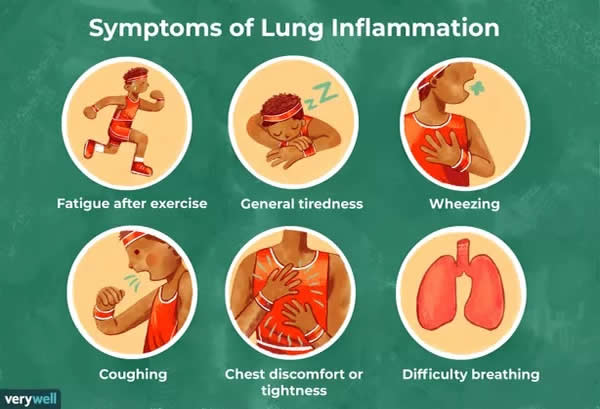Positive Health Online
Your Country

What is Inflammation of the Lungs, its Causes and Treatment
listed in infections and inflammation, originally published in issue 277 - March 2022
Inflammation of the lungs occurs because of lung diseases where the body tries to fight an irritant, resulting in swelling and redness of the lung tissue, shortness of breath, chest pain, and tightness. Lung inflammation can be of two types: acute or chronic.
https://www.verywellhealth.com/chest-pain-common-potential-causes-1745274
Source: Verywell Health / Nez Riaz
Lung Inflammation Symptoms Include:
- Over exhaustion after a physical activity
- Wheezing
- Dry cough
- Difficulty in breathing
- Pain and discomfort in the chest
- Fatigue
Lung Inflammation Can Be Caused By:
- Irritant Exposure
Certain types of substances like cigarette smoke, pollutants, chemicals, environmental fumes, etc., irritate the air sacs, which leads to lung inflammation. For example, pneumonitis is a common term used for dispersed lung inflammation caused by exposure to chemical irritants.
- Infections
Lung infection occurs when a dangerous bacteria or virus enters the lungs and causes damage. A few types of lung infections are acute bronchitis, pneumonia, and tuberculosis. Severe lung infections may cause acute respiratory distress syndrome (ARDS), which is a life-threatening condition.
- Asthma & COPD
Asthma and COPD are respiratory conditions that constrict the airways. Both the diseases cause shortness of breath and constant fatigue. While asthma is characterized by episodic bronchospasm and lung inflammation triggered by an infection or an environmental irritant, chronic obstructive lung disease (COPD) includes emphysema and chronic bronchitis, which is often caused due to smoking, genetics, air pollution, dust, or fumes.
- Costochondritis
It is an inflammation of the cartilage that connects the rib to the breastbone. Apart from developing trauma and muscle strain, it causes chest inflammation that spreads to the lungs and induces a sharp pain in the chest area, which worsens when coughing or taking deep breaths.
- Systemic Diseases
Systemic diseases like sarcoidosis, fibromyalgia, rheumatoid arthritis that affect the entire body can make the lungs scarred, inflamed, and stiff, making it difficult for the lungs to function.
- Cystic Fibrosis
It is an inherited life-threatening disorder that damages the lungs and the digestive system. Cystic fibrosis affects the cells causing the mucus to become thick and sticky. The thick fluid then blocks the tubes and passageways in the lungs.
- Pericarditis
Pericarditis is the inflammation of the pericardium, the membrane that surrounds the heart. The inflammation spreads to the lungs causing intense chest pain, which worsens while coughing or taking deep breaths.
- Pulmonary Hypertension
It is characterized by high blood pressure in the lungs, which affects the blood vessels between the heart and the lungs. These blood vessels thicken and become constricted, which leads to shortness of breath and chest pain.
- Chronic Pneumonia
It is a persisting lung infection caused by harmful bacteria or viruses. The air sacs fill up with fluid which disrupts the flow of oxygen. Symptoms include coughing up blood, chills, and fever.
- Lung Cancer
In lung cancer, the growth of the cells becomes abnormal, slowly developing into tumours. It can be asymptomatic at first, making it hard to detect, but eventually, it is accompanied by a nagging cough, wheezing, and shortness of breath.
Lung Inflammation Treatment Choices
- Anti-Inflammatories
Corticosteroids are a common resort to reduce lung inflammation. Inhalant corticosteroids like Clenil Modulite and Kelhale help control asthma and COPD flare-ups. Oral or injectable anti-inflammatories are used to treat systemic lung inflammation.
- Tailored Treatments
These treatments target the diseases that cause lung inflammation. For example, oral antibiotics need to be given in cases of pneumonia to fight the bacteria. In the case of pulmonary embolism, the treatment involves blood thinners, whereas chemotherapy is prescribed to treat lung cancer.
- Operative Procedures and Surgeries
Procedures are done to repair lung damages that might have been caused by a deep, penetrative surgery or to remove glass/metal pieces. One might also need procedures to stop bleeding in case of torn tissues or blood vessels. Lung cancer and COPD often requires surgery to remove the affected area of the lungs.
Protect Your Lungs by Following These Tips
The first step towards protecting your lungs is to quit smoking, as it damages the lungs in unimaginable ways! Reduce exposure to environmental pollutants and stay away from people suffering from infectious diseases. Always wash your hands to get rid of bacteria and viruses. Your lungs need exercises like deep breathing, yoga, or aerobics to keep them healthy. Also, ensure that you are eating proper nutrition. Take your vaccine shots on time.
Lung inflammation can sometimes cause irreversible damage to the lungs if not examined and treated on time. So, ensure that you consult a doctor and undergo necessary screenings when you experience persisting symptoms.
Comments:
-
No Article Comments available
